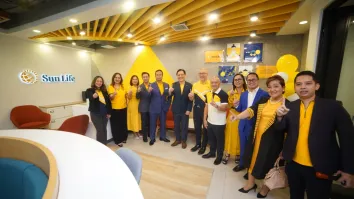
Filipino gamers hold promise for FWD
The insurer plans to support other games and aspects of the gaming ecosystem beyond esports.
FWD Group, a pan-Asian life and health insurer, is trying to convince more Filipino gamers like Salvador to get covered, in a country where the life insurance penetration rate is only 1.4%.
Whilst 85% of the Philippines’ 43 million gamers are aware of the health risks from video games and think insurance is important, less than a third actually own a policy, according to FWD Philippines.
That is still considerable given that less than 2% of Filipinos had life insurance in 2022, compared with Singapore’s 9.54%, Thailand’s 3.55%, Malaysia’s 2.9% and Vietnam’s 1.81%, according to data from the ASEAN Insurance Council.
"The primary barrier that prevents the remaining majority from getting insurance is really prioritisation," Roche Vandenberghe, chief marketing and digital business officer at FWD Philippines, told Insurance Asia.
This is especially true given spiralling prices and high interest rates. For many, insurance is a nonessential expense, overshadowed by more important financial concerns.
Revenue of Southeast Asia’s video game market is projected to grow by 8% to $5.5b in 2024, according to a Nico Partners, Inc. report released in September 2024. It is expected to become a $7.1b industry by 2028, or a compound annual growth rate (CAGR) of 6.7%.
The Filipino gaming community, largely Gen Z and millennials, grew by 14.3% in 2023 from 2020, according to FWD.
Competitive online gaming or esports has a significant economic influence in the Philippines, and FWD wants to capitalise on that.
The country is ranked seventh in the world in terms of esports earnings, with the average esports earnings per player at $178,000 or almost Php10m, mainly due to Mobile Legends: Bang Bang. The market value of this industry is expected to hit $3.6b by 2025, FWD said.
Although most gamers rate their overall health status as at least good, many grapple with gaming-related concerns such as vision problems (41%), insomnia (17%), and migraine (15%), according to a study released by the insurer in June. Some have also experienced mental issues during a losing streak, strained relationships, and even financial mishaps.
Anna Karenina Salvador, 30, admits she knows very little about gaming insurance, although she does have a life insurance plan that she pays for each month.
“It never crossed my mind,” she said of gaming insurance. But she might get one soon “because I now realise how easily my eyesight has been deteriorating.”
FWD, which has 12 million customers across 10 markets in Asia, offers insurance coverage for vision loss, hypertension, and urinary and joint problems given the physical toll of extended gaming sessions.
“We saw this as an opportunity to provide health protection whilst also introducing better financial literacy,” Vandenberghe said.
FWD has also introduced rewards within its insurance plans, such as in-game rewards and discounts on vision protection products such as blue light lenses and corrective contact lenses.
The FWD study identified the top priorities of each gamer segment, with fans showing a strong interest in building their own houses (73%), whilst enthusiasts seek to establish their own businesses (70%). Most gamers prioritise savings, followed by life insurance.
Amongst those who don’t own insurance, two out of five gamers lack adequate knowledge about FWD’s insurance products, hindering their ability to make informed financial decisions.
Whilst video games have health risks, apart from the fact that some promote gambling whilst others can get you addicted, they can also have positive effects if played in moderation.
‘Game of life’
There are video game characters that awaken early vocations and teach history, geography, mathematics and languages. Some games improve critical thinking, strategy and leadership; stimulate creativity, focus and visual memory; and encourage teamwork, according to separate studies by universities in the US, Mexico and Finland.
A June 2024 survey by ING Bank Australia showed that young Australians have learned to manage their finances through gaming. About 38% of Australian gamers reported having gained financial knowledge through video games.
The games most cited for teaching financial skills were The Sims, Minecraft, Financial Football, Animal Crossing, and Call of Duty. Of these, The Sims was the most popular, followed by Minecraft and Animal Crossing.
The survey also found that 28% of respondents said video games had helped them develop general saving habits, 27% learned about profit and loss, 25% gained budgeting skills, 20% became more knowledgeable about investing, and 15% learned about managing debt.
Vandenberghe said their insurance policies could be bought conveniently from their online shop since they know that gamers are primarily present in the online space.
Of course, no one will buy gaming insurance if it’s too expensive. FWD’s insurance products for gamers start at just $5.90 (Php330) yearly.
“There are no medical or even in-person assessments needed so that gamers can protect themselves in less time than it takes to play a single round of multiplayer online battle arena,” Vandenberghe said.
She added that insurance plans are entirely digital, and gamers could buy and manage their insurance policies online. “We made sure that The One for gamers melds seamlessly with their gamer lifestyle.”
FWD, which was the official insurer of Filipino esports athletes at the 12th season of Mobile Legends: Bang Bang Professional League in 2023, said it plans to support other games and aspects of the gaming ecosystem, including game developers and casual gamers.
“We already cover health-related risks with our products, but we believe there's still so much we can do by offering financial literacy,” Vandenberghe said. “Last year, the Philippines won in the world match. Along with gaming skills and strategy, these are the skills we also need in the ‘game of life.’”



















 Advertise
Advertise









